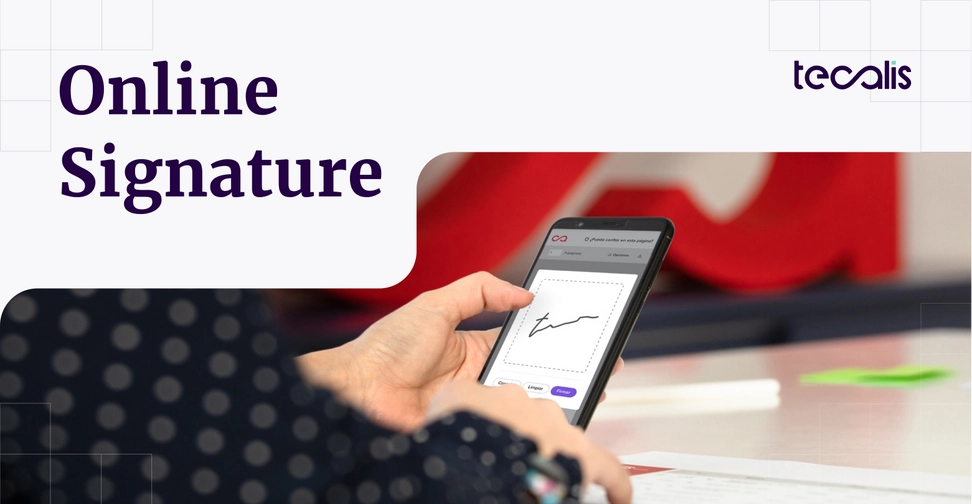Index
Get the latest news right in your inbox
The online signature of documents is presented as free on many occasions, something that is really uncertain. Inserting a png image file into a pdf document cannot be considered an electronic signature. In order to create an online digital signature, the process must be carried out according to the rules contained in the eIDAS directive, which regulates the technical and legal standards with which the process must comply to be considered an electronic signature.
Businesses use e-signatures to design streamlined contracting processes at points of sale and sales offices while also being able to offer a fully digitized and remote customer sign-up. The different online signature tools used by businesses have a number of unique features that must be taken into account in order not to bypass regulatory requirements and at the same time provide a quality customer experience.

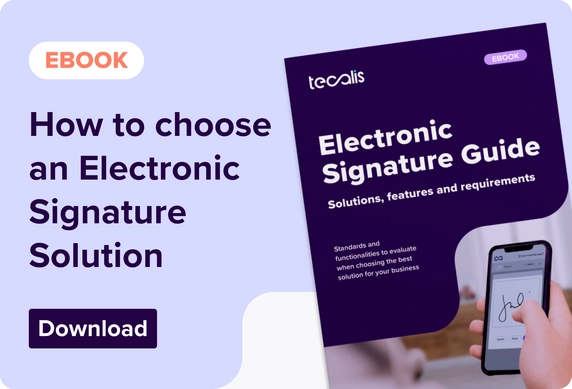
What is an online signature?
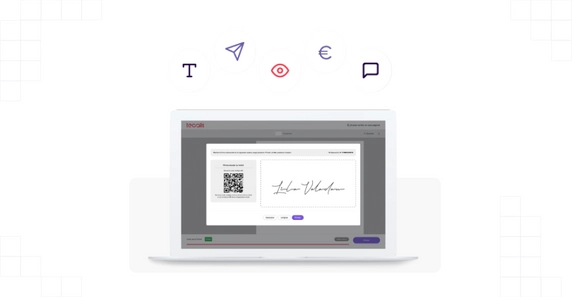
An online signature is a method of accepting the content of a document by digital means and on web-based platforms. This process occurs on platforms designed to be able to send, receive and manage electronic signatures - also certified communications in some cases. There are several types of websites and systems, some aimed at individuals and others to be integrated into the operations and activities of companies and businesses.
It is important to understand that the online signature that consists in the insertion of a graph or png image with a "handwritten signature" in a digital document in PDF has no legal validity whatsoever. Anyone can obtain an image by different means of the signature of an individual and "paste" it in a word, pdf or any other document format.
How to sign documents online
The process of digitally signing documents through online channels is carried out with a few simple basic steps: The creation of the signature request by the sender, the receipt of the sending by the recipient, the exercise of the signature as such, and the storage of this in the systems of the application or the requesting company.
Trust service providers are those RegTech partners and companies in charge of offering individuals and businesses online signature platforms that comply with all regulatory and technical requirements. All you have to do is access their platforms to set up a submission as detailed in the previous paragraph and the web application will take care of sealing the content of the document, linking it to the signer's identity information, and preventing its subsequent alteration.
Companies will have dozens of options on their digital signature platforms for automated, sequential, bulk, with or without attachment of identity documentation to contracts, etc. In the case of a private user, they can both make signature requests to another user and upload a PDF document to the platform and sign it with the appropriate technology recognized by law. However, this method is nothing like - as we have explained - the simple insertion of a PNG.
These types of platforms work well as a monthly subscription that includes a package with a number of signatures and specific functionalities or they can simply charge for one use.
Use in banking and FinTech
While e-signatures are an essential tool for any business and individual today, there is one area in the economy where they are even more relevant: finance. The BFSI industries (banking, financial services and insurance) need online signature websites to be able to sign up new customers over the Internet.
This also applies to areas such as telecommunications - to contract mobile, fiber or TV services over the phone - and to facility services (electricity, gas, water...) for the same purpose, to be able to offer their products and services remotely.
Electronic signature for bank account opening and user registration
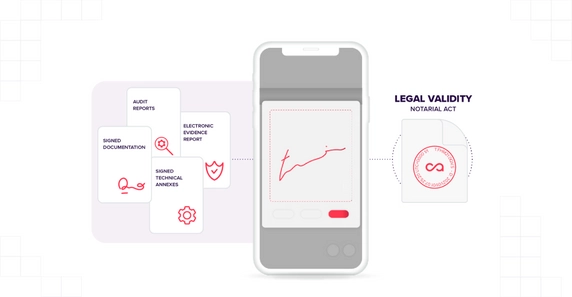
However, many of you may have noticed that when contracting a product or service with an electronic signature over the Internet you have to wait to be able to make use of it. We are not referring to the registration of a supply (which does have some steps and bureaucratic procedures to be active), but to those that can be used from minute 1 but that for some reason we cannot start to enjoy from the moment we sign the contract.
This is because the company is using an online signing platform that does not include built-in KYC identity verification controls. Thanks to the emergence of holistic engagement and signature platforms designed for this sector, firms can now verify their client data in real-time and pass AML (Anti-Money Laundering) checks equivalent to a comprehensive CDD (Client Due Diligence) process.
The Know Your Customer process can be integrated in a unified way with the online digital signature of documents, without the need to use multiple vendors or different applications. In addition, the best onboarding platforms do not force customers to fill out PDF files in an unintuitive way but connect with the company's systems to integrate them into the KYC+Signature process with greater support and without leaving the main interface of the recruitment website.
Digital certificate to sign
The digital certificate is sometimes confused with the concept of an electronic signature. Although they are closely related, they are not the same. The digital or electronic certificate (sometimes key) is digital data created by a certification authority (or Trusted Third Party) that corroborates that the person using it is who he/she claims to be and that his/her identity is equivalent to that of a natural person registered by an entity or institution by means of a public key.
To sign a PDF with an online digital certificate, the signature must be created with electronic means recognized by eIDAS. In other words, those available from trusted electronic service providers. Therefore, online signature generators that meet these requirements must be used.
Digital signature and recognized types
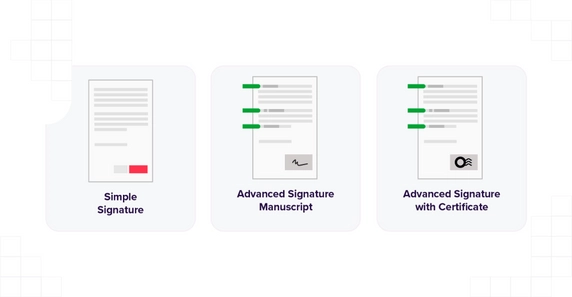
For an online signature to be valid, it must be linked to electronic data created under the eIDAS standard. There are three types of legally binding online signatures recognized by the regulations:
- Simple electronic signature: This type of signature is the simplest of all. It is absolutely fast and agile but lacks evidentiary validity because it does not make an identity check with advanced standards.
- Advanced electronic signature: The second standard recognized by eIDAS is the most versatile and complete. In addition, as mentioned above, its implementation together with Know Your Customer makes it the preferred method for both companies and users to contract and to be the online signature tool of reference. It has the full evidentiary capacity and is widely accepted by the average user.
- Qualified Electronic Signature (QES): The most complex formula for electronic identification and online signature is used especially by the public administration, which is one of its greatest supporters and promoters. Although it is absolutely secure and 100% recognized, users still find it very difficult to use it, which generates many abandonments and low conversion rates in contracting processes.
The European directive on electronic IDentification, Authentication, and trust Services is the reference framework on which online signature applications and websites must be built. In the near future, we will see how the birth of eIDAS 2 - the update of the current regulation in force - will overturn these standards and make it even easier for both private users and companies to use electronic signatures.
Free online signature platforms
Not all online signature platforms are the same. As we have seen, there are those that present a type of signature that they are not really offering, because for an electronically signed document to be considered valid and with the denomination of "electronic signature" it must be created and signed online with the guarantees required by the state, sectorial and international regulations that apply to it.
On the other hand, within the signature platforms that do comply with the regulation, not all of them have the same features. Some are not just online signature web applications but can be seen as the documentation and management center of a business.
Functionalities and features for digital signatures
The latter help to solve hundreds of use cases in businesses of all sectors since they have possibilities for scheduling, making signatures according to the activity of a client or commercial agent as well as acting as a negotiation platform, allowing both signatories and applicants to make changes in a document, editions, additions of files of all kinds (images, videos...), create customized templates to be filled in and indexable fields.
Online signature for companies
Integrating and automating signature processes within businesses is easy thanks to agile, secure, and affordable technologies. SaaS (Software as a Service) and Paas (Platform as a Service) have enabled companies to dispense with large web development projects to simply integrate an online signature tool within hours throughout their organization.
As we have analyzed, the new high-capacity digital signature solutions can function as centers for managing the activity of a business, both internally (aimed at employees, suppliers, and others) and externally (with customers and users).
Now, the scalability of these solutions designed by RegTech specialists, allows them to be absolutely simple for small companies and individuals, and fully powerful, capable, and functional for large multinational businesses. In addition, these partners act as digital transformation partners developing large projects based on these agile tools and technologies for the entire customer journey. In short, bringing together the best of both worlds with an up-to-date, modern, and resilient perspective.
















